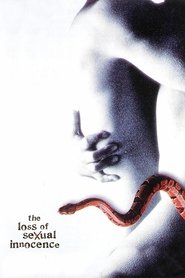“The Loss of Sexual Innocence” is a visually stunning and poetic exploration of love, lust, and loss. The film uses a metaphorical approach to depict the protagonist’s journey through sexual awakening, heartbreak, and redemption. Through dreamlike sequences and haunting imagery, it touches on themes of nature, spirituality, and the fragility of human connection. The film offers a mesmerizing glimpse into the complexities and contradictions of human desire.

Review
The Loss of Sexual Innocence is a movie that tackles the complexities of sexuality and relationships that resonate with audiences to this day. The film released in 1999, directed by legendary filmmaker Mike Figgis, features a nonlinear storyline that intertwines various themes of loss, love, and self-discovery. It presents a unique insight into the human psyche and explores how our past shapes our present.
Starring Julian Sands, Saffron Burrows, Stefano Dionisi, Kelly MacDonald, and Jonathan Rhys Meyers in lead roles, the movie follows the life of Nic (played by Sands), a successful photographer who revisits his childhood memories. While his life seems perfect on the surface, he desperately seeks to rediscover his lost innocence after several failed relationships.
One of the most memorable quotes from the film comes from Sands’ character: “The heart is what I lose when I think too much.” The line encapsulates the central theme of the film: exploring people’s hearts and minds; their emotions are what drive them forward.
The movie’s nonlinear structure creates an immersive experience that alludes to Nic’s fragmented memories. As he remembers different incidents from his past – moments with his parents (played by Bernard Hill and Gina McKee), childhood sexual abuse at boarding school – Nic’s journey takes unexpected turns as he tries to reconcile these events with his adult life.
The film’s cinematography is breathtaking as it shifts between different hues; each shot captures a distinct mood that complements each scene. Filmed on location in Scotland and Italy, Figgis beautifully captures stunning landscapes like decaying castles and haunting forests.
The soundtrack also enhances the film’s emotional impact. Various artists – including instrumentalists like Pat Metheny – contributed original music pieces for the movie. The score weaves seamlessly through each scene, accentuating the characters’ emotions.
One thing notable about this movie is how it was initially received some criticism due to the complex themes it tackled. However, over time, the film’s popularity has soared as people realize its substance and depth. Critics have also praised it for its nuanced performances and unique storytelling.
The Loss of Sexual Innocence wasn’t a commercial success upon its release. But it has been embraced over time as a cult classic that explores the complexities of human emotions and relationships. The movie is a masterpiece in its genre, offering audiences a glimpse into the intricacies of human connection.
In conclusion, if you’re looking for something thought-provoking and emotionally engaging, The Loss of Sexual Innocence is worth watching. Figgis’ innovative directing style coupled with the stellar performances by Sands, Burrows, Rhys Meyers, and Dionisi make it an unforgettable cinematic experience. It’s an exploration of what it means to be human, how our past experiences influence us in ways we can’t even imagine yet shape who we are today.
Technical Data

- Runtime : 106
- Release : 1999-04-29
- Genre : Drama
- Cast : Julian Sands as Adult Nic, Saffron Burrows as English / Italian Twin, Justin Chadwick as Flash Man, Stefano Dionisi as Luca, Kelly Macdonald as Susan
- Crew : Jina Jay as Casting, Mike Figgis as Director, Mike Figgis as Producer, Mike Figgis as Author, Annie Stewart as Producer
- Popularity 7.19
- Budget : $4,000,000
- Revenue : 0
- Company : Red Mullet Productions, Summit Entertainment, Newmarket Capital Group
- Summary : The story of the sexual development of a filmmaker through three stages of his life.
- Tagline :
